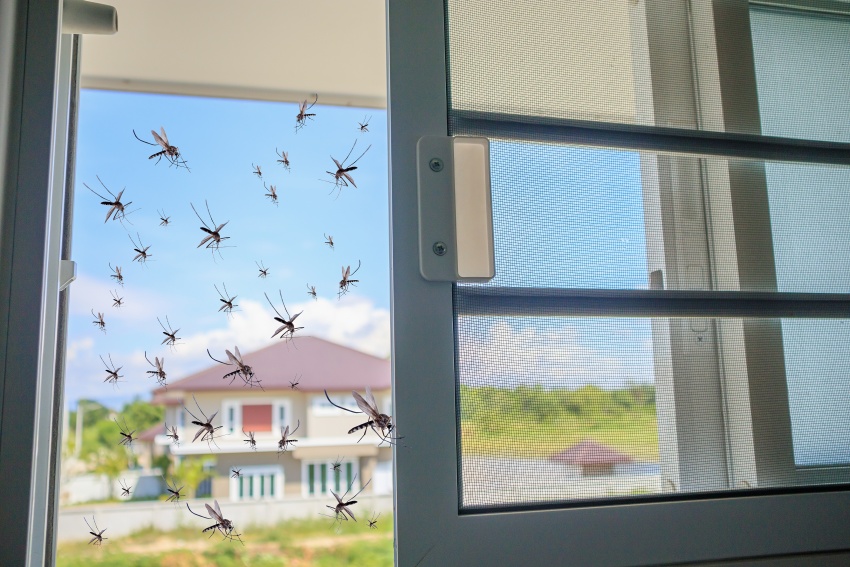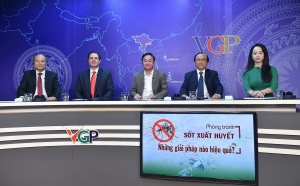According to the Ministry of Health (MoH), in the first five months of 2025, the country recorded 22,974 dengue cases and five deaths. This indicates that risks remain, especially in the context of overlapping outbreaks such as dengue, hand-foot-and-mouth disease, and COVID-19 increasing in some localities.
At the end of May, the MoH issued an urgent directive calling for strengthened leadership, surveillance, and communication to reduce dengue-related fatalities.
Dengue was previously known for having an outbreak cycle of about once every five years, with a clear “quiet period”. But now, epidemiological patterns have changed alarmingly. It is no longer seasonal and has spread geographically.
Information about the unpredictable developments, burdens, and risks posed by dengue was shared by experts at a recent online talk show organised by Suc khoe & Doi song, the official media voice of the MoH, in collaboration with Takeda Vietnam Pharmaceuticals Limited. Takeda has made significant efforts to support the health sector by raising community awareness about dengue. The talk show was held under the theme: “Towards zero dengue deaths: Collective disease prevention with integrated solutions”.
| Guest speakers at the talk show |
Dr. Vo Hai Son, deputy director of the Vietnam Administration of Disease Prevention, said, “Previously, high case numbers followed a cycle of about five years, but now it has changed, and high case numbers appear roughly every two years.” He further explained that urbanisation, migration, and easier travel between regions have facilitated the wider and harder-to-control spread of dengue fever.
Assoc. Prof. Dr. Pham Quang Thai, vice head of the Infectious Diseases Control Department at the National institute of Hygiene and Epidemiology, stated from an epidemiological perspective that dengue has now spread across provinces, including mountainous areas that previously recorded very few cases. This development means that everyone needs to be more proactive in responding to the disease.
Negligence and improper handling
Although general awareness about dengue has improved, according to experts, a significant portion of the population remains negligent and mismanages the illness, leading to cases of late hospitalisation, severe disease progression, and even death.
Assoc. Prof. Dr. Do Duy Cuong, director of Bach Mai Institute of Tropical Medicine, said, People with a fever may assume it is due to other illnesses like the flu, but in reality some cases show no clear symptoms, and patients arrive at the hospital late, already in shock or with multiple organ failure.
 |
| Misinterpretation of symptoms causes many people to self-treat at home, missing the “golden period” for intervention and facing unpredictable risks |
A typical case shared by Cuong involved a male student from the countryside living in rented accommodation in Hanoi. Due to poor living conditions, when he had a fever, he just stayed in his room and ate sparsely. He was only admitted to hospital on the fifth day, when his condition had worsened, and he was showing signs of shock and haemoconcentration.
Additionally, dengue is caused by a virus and has no specific cure. The unauthorised use of antibiotics, corticosteroids, or IV fluids without a doctor’s prescription is a serious mistake that can worsen the illness.
Comprehensive collaboration towards zero dengue deaths
To cope with the increasingly complex dengue epidemiology, reduce fatalities, and effectively control outbreaks, experts emphasise the need for a comprehensive strategy including vector control, epidemiological surveillance, early warning systems, behavioural communication, and strengthening of the health system. Among these, vaccination, a new solution endorsed by the World Health Organisation (WHO), is a part of the overall strategy, enabling proactive prevention and reducing the risk of severe disease progression.
Sharing at the talk show, MSc. Dr. Vo Hai Son emphasised the importance of controlling disease vectors, along with proactive actions from everyone: “Social measures, together with the proactiveness in each locality, neighbourhood, and household, will make people aware of the risks of infection and death due to dengue. From there, we will coordinate with the health sector to eliminate mosquito larvae and mosquitoes. This will help enhance disease and vector control.”
Adding to the vector control solution, Assoc. Prof. Dr. Pham Quang Thai also pointed out the unpredictable challenges in urban environments. “Some people say their apartment is on the 30th floor and they don’t see mosquitoes, so they believe they’re safe. But don’t assume that. Mosquitoes are very smart. They don’t fly directly from the first to the 30th floor, but instead ascend step by step, breeding on each floor. As a result, even the highest floors of apartment buildings will have mosquitoes.”
 |
| High-rise apartment buildings are not safe zones for dengue. Mosquitoes will still breed and transmit dengue if not properly controlled |
From the perspective of an enterprise accompanying Vietnam’s health system, Benjamin Ping, general manager of Takeda, said, “We believe that multi-sectoral collaboration plays a key role because no single unit or organisation can effectively control dengue alone.”
Ping also emphasised the necessity for cooperation between the government, the health sector, businesses, and the community. He stated that Takeda is committed to contributing to collective efforts by strengthening healthcare system capacity, supporting community communication, and ensuring sustainable access to vaccinations as an integral part of the disease control strategy.
Additionally, the role of health education is indispensable. It is necessary to implement diverse, official, and continuous campaigns to raise community awareness, help people understand the disease correctly, recognise early symptoms, avoid negligence, and seek medical care in time. In addition, vaccination is also considered one of the proactive preventive solutions, helping to reduce severe cases and fatalities caused by dengue.
The WHO is currently recommending the use of Takeda’s dengue vaccine for certain populations in countries with high transmission rates and significant dengue burden. This vaccine has been approved in 40 countries, with over 15 million doses distributed globally.
Disclosure
This content was jointly developed by the Sức khỏe & Đời sống Newspaper, and has been professionally reviewed and approved by the Vietnam Association of Preventive Medicine with the aim of raising public awareness. It is intended solely for public informational purposes and should not be used for the diagnosis or treatment of any health condition. This material is not a substitute for professional medical advice. Please consult your physician for further guidance. C-ANPROM/VN/NON/0034
 |
Experts discuss dengue fever prevention in Vietnam
Takeda, a global biopharmaceutical company, hosted a series of meetings in Ho Chi Minh City and Hanoi on September 26-27 to discuss the essential role of vaccines in an integrated dengue prevention strategy in Vietnam and globally. |
 |
Integrated solutions for dengue fever prevention in Vietnam
Dengue vaccines being available in Vietnam contributes to strengthening the prevention and control strategy for this infectious disease, but synchronised implementation of multiple solutions is needed to ensure vaccine sustainability. |
 |
Concerns mount over potential dengue fever outbreaks
At a recent scientific symposium on dengue vaccines in Ho Chi Minh City, experts warn that dengue fever is shifting from a seasonal outbreak to a year-round public health threat, with treatment costs in some cases approaching $40,000. |
